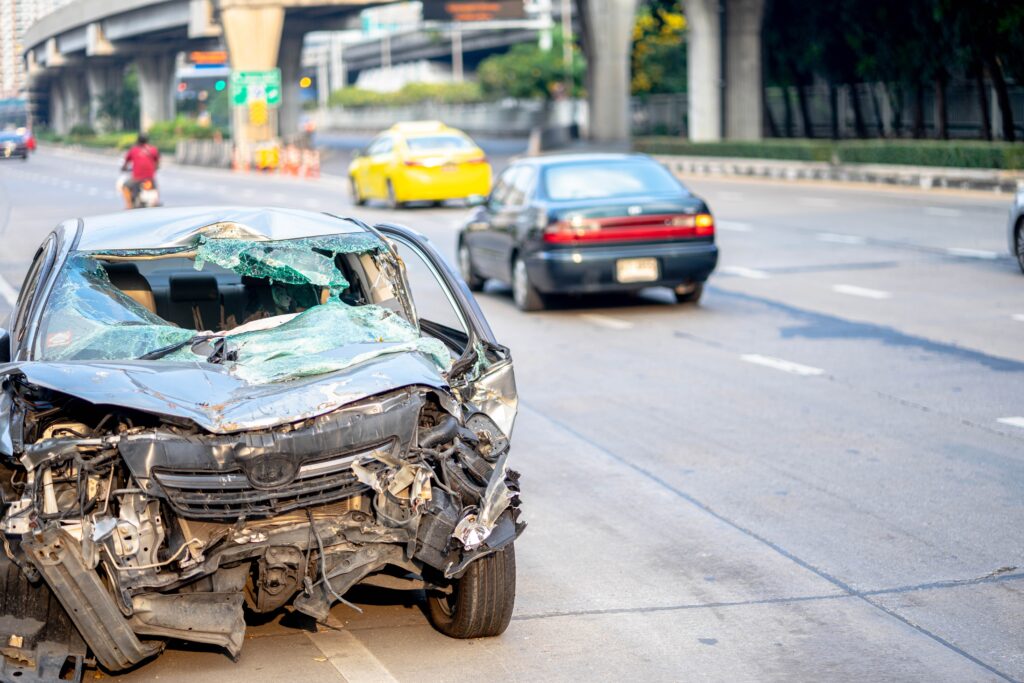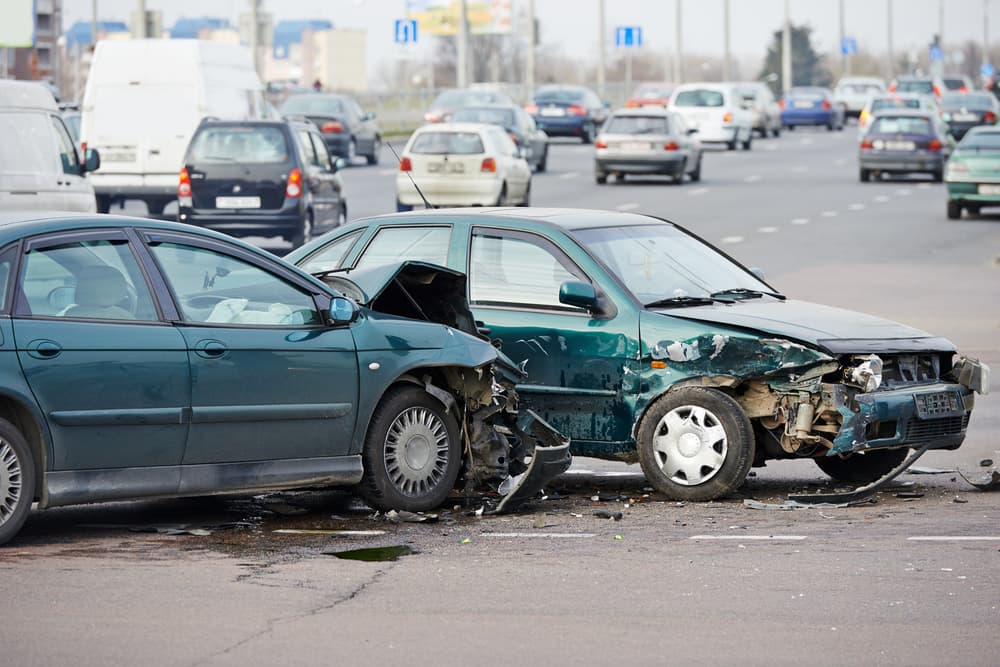Losing a loved one to a reckless accident is a heart-wrenching experience many face each year. According to the National Highway Traffic Safety Administration (NHTSA), speeding is a factor in 29% of fatal accidents. That's nearly one in three deaths on our nation's roads that might have been avoided if drivers had simply followed the speed limit.
People make a conscious decision to speed, so it only compounds your grief and suffering, knowing your loved one would still be alive were it not for another person's careless decision. Now, you're dealing with final medical expenses, funeral and burial costs, and perhaps the loss of income and support your loved one provided.
You may qualify to obtain compensation from those responsible for your loss. A Minnesota fatal car accident attorney can review your case at no cost and advise you of your options. If you qualify, a lawyer can help you pursue a wrongful death claim to recover damages resulting from a fatal speeding accident.
Startling Statistics on Speeding-Related Fatalities
The fact that speeding is a factor in 29% of fatal accidents is alarming enough. However, when we break down the NHTSA data further, the picture becomes even more concerning:

- Speeding-related crashes claimed over 12,000 lives annually in recent years. That figure has been steadily increasing since 2020.
- More than 300,000 people sustained severe injuries in speed-related crashes.
- Around 29 percent of drivers who caused fatal speeding accidents had no valid driver's license.
- Young drivers ages 15-20 make up the highest percentage of drivers involved in fatal speeding accidents. Around 35 percent involved young male drivers, while 19 percent involved young female drivers.
- More than 87 percent of fatal crashes due to speeding occurred on non-highway roads.
- Drivers with high blood alcohol content (BAC) levels were involved in fatal speeding accidents more frequently than sober drivers.
- Speeding was a factor in around 35 percent of motorcycle fatalities.
Although 29 percent is the national average, state-specific percentages can be higher or lower. For instance, Minnesota has a speeding-related traffic fatality rate of 30 percent, while North Dakota has a rate of 28 percent. Wisconsin aligns with the national rate of 29%, while Iowa's rate is lower at 22 percent. The only thing more prevalent and fatal than speeding accidents in these states is drunk driving.
How Speeding Crashes Increase the Severity of Motor Vehicle Accidents
It's not just that speeding makes accidents more likely to occur – it also dramatically increases the severity of crashes when they do happen. There are several reasons for this:
- Increased stopping distance
- Reduced reaction time
- Greater force of impact
Let's cover each one.
Increased Stopping Distance
Speeding reduces the time a driver has to react to changing traffic conditions, increasing the risk of crashes. Additionally, when a driver is speeding, their vehicle requires a much longer distance to come to a complete stop. For example:
- At 20 mph, the average car needs about 40 feet to stop.
- At 40 mph, that distance triples to 120 feet.
- At 60 mph, it takes a whopping 240 feet to come to a complete stop.
These figures account for "thinking distance" and "braking distance." This increased stopping distance can mean the difference between a near-miss and a devastating collision. However, these figures also assume ideal road conditions. In wet or icy weather, stopping distances increase even further.
Reduced Reaction Time
Speed also impacts a driver's ability to react to sudden changes in road conditions or the actions of other drivers. This can lead to:
- Failure to notice pedestrians or cyclists
- Inability to navigate turns or curves safely
- Reduced capacity to adjust to sudden traffic slowdowns
Greater Force of Impact
Perhaps the most devastating effect of speeding is the increased force of impact in a collision. The physics are simple but sobering: the faster a vehicle is traveling, the more kinetic energy it carries. In a crash, this energy is transferred to whatever the vehicle strikes—be it another car, a stationary object, or a pedestrian.
The relationship between speed and impact force is not linear—it's exponential. Doubling your speed quadruples the force of impact. This means that even small increases in speed can have dramatic effects on crash outcomes.
Even in situations where a pedestrian, cyclist, or motorist isn't killed in the accident, the likelihood of sustaining more severe harm, such as spinal cord injuries or traumatic brain injuries, is high. Those who survive the accident and suffer these and other crash-related damages may be looking at a lifetime of medical care and treatment needs.
What Are the Legal Consequences of Speeding in Car Accident Cases?
When a driver's decision to speed results in an accident, they may face severe legal repercussions. These consequences can be both criminal and civil in nature.
Criminal Penalties
In most states, speeding that leads to an accident can result in criminal charges, especially if the crash causes injury or death. Possible charges include:
- Reckless driving
- Vehicular assault
- Negligent homicide (in cases of fatal accidents)
Penalties for these speeding-related accident offenses can include:
- Hefty fines
- License suspension or revocation
- Jail time (particularly for repeat offenders or in cases involving fatalities)
Civil Liability
Beyond criminal charges, exceeding posted speed limits and causing an accident may open negligent drivers up to civil lawsuits from injured parties or the families of those killed in crashes. In these cases, the at-fault driver may be held liable for:
- Medical expenses
- Lost wages
- Pain and suffering
- Property damage
- In fatal cases, wrongful death damages
In severe motor vehicle accidents resulting from speeding, the financial consequences for the at-fault driver can be substantial.
Impact on Insurance Claims
Speeding vehicles that cause accidents can also have significant implications for insurance claims:
- If you're the at-fault driver, your insurance rates are likely to increase dramatically.
- Your insurance company may deny coverage if you were engaged in reckless behavior (like excessive speeding).
- If you're the victim, the at-fault driver's insurance may try to argue that you shared some responsibility for the accident to reduce their payout.
These complex legal and insurance issues underscore the importance of having skilled legal representation if you've been involved in an accident caused by a speeding driver.
What Compensation Is Available After A Fatal Speeding Accident?
Losing a loved one in a fatal car accident caused by a speeding driver is a devastating experience. While no amount of money can make up for your loss, pursuing compensation can help ease the financial burden and hold the at-fault party accountable. A fatal car accident lawyer can work to recover damages like:
- Funeral and burial expenses
- Lost income and benefits
- Loss of companionship
- Pain and suffering
- Punitive damages in cases of extreme recklessness
By letting a skilled lawyer manage the legal process, you can focus on grieving and healing. Most personal injury attorneys offer free consultations and work on a contingency fee basis, so there's no upfront cost to get experienced and compassionate help during this difficult time.
What You Need To Know About Fatal Speeding Accidents and Recovering Compensation
Each state has a legal deadline for filing a wrongful death action. For example, Minnesota and Wisconsin both allow you three years from the date of the death to file a wrongful death lawsuit in civil court. North Dakota and Iowa allow only two.
If you fail to have an attorney file a wrongful death suit for you within your state's statute of limitations, the court will likely dismiss your case, leaving you no legal recourse to get the compensation you need.
Additionally, only certain eligible family members may bring wrongful death actions. These typically include the surviving spouse, children, or parents. Legal professionals can inform you whether you qualify to pursue a wrongful death claim and guide you through the process.
Have more questions or concerns about filing a wrongful death claim or lawsuit after a loved one is killed in a speeding crash? Consult an attorney as soon as possible to ensure you don't miss any important deadlines that would prevent you from recovering damages.
How Can A Car Accident Lawyer Help?
When dealing with the aftermath of a car accident, especially one caused by a speeding driver, having an experienced personal injury attorney on your side can make a world of difference. Here's why:

- Legal knowledge: Personal injury law is complex, with many nuances and potential pitfalls. An experienced attorney understands these intricacies and can navigate them effectively.
- No upfront costs: Most personal injury attorneys work on a contingency fee basis, meaning you don't pay unless they obtain compensation for you.
- Objectivity: When dealing with the emotional trauma of an unexpected loss, it can be hard to make clear-headed decisions. An attorney can provide objective advice and guidance.
- Investigative resources: Personal injury lawyers often have access to accident reconstruction experts, medical professionals, and other specialists who can strengthen your case.
- Negotiation skills: Insurance companies have teams of lawyers working to minimize payouts. You need someone equally skilled in your corner.
- Trial skills: If your case goes to trial, you must have an attorney with trial experience. They will know how to file a lawsuit and engage in discovery. They can also present a compelling case in court to help sway the judge or jury's decision in your favor and fight for the maximum compensation possible.
One important intangible benefit of working with an attorney is peace of mind. You can rest easier knowing a skilled professional is handling the legal complexities, allowing you to focus on recovering from the event.
How an Attorney Can Help When A Speeding Crash Kills a Loved One
An experienced car accident attorney can:
- Conduct a thorough case analysis: This includes visiting the accident scene, reviewing police reports, interviewing witnesses, and consulting with experts.
- Help gather and preserve evidence: Your attorney can help collect all relevant evidence, including photos, video footage, and physical evidence from the crash site.
- Handle all communication: Your lawyer can deal with insurance companies and other parties, protecting you from potentially damaging statements.
- Calculate full damages: An experienced attorney often knows how to accurately assess all current and future costs related to your accident.
- Negotiate for a fair settlement: Your lawyer can negotiate tenaciously to maximize your financial recovery, often without the need for a trial.
- Prepare for trial if necessary: If the at-fault party's insurance company refuses to offer a fair settlement, your attorney can be ready to take your case to court.
Find out more ways a lawyer can help you build a strong case to recover the justice and compensation you deserve by scheduling a free case evaluation with a personal injury law firm.
Are You Seeking Compensation For The Wrongful Death of a Loved One Killed in a Speeding Accident? Contact Nicolet Law Accident & Injury Lawyers Today.

If aggressive driving from a speeding motorist caused a crash that killed a close family member, the experienced Minnesota personal injury attorneys at Nicolet Law Accident & Injury Lawyers are ready to fight for your rights and help you secure the compensation you deserve.
Don't let the insurance companies take advantage of you, and don't settle for less than you deserve. Contact Nicolet Law Accident & Injury Lawyers online or at 1-855-NICOLET for a free, no-obligation consultation. We'll review your case, explain your options, and help you take the first steps toward justice and fair compensation.
